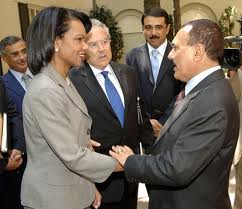 Protesters in south Yemen called for the secession of the once independent south today. Security forces were out early in the day with tanks and police to force protesters back inside. Scores of protesters were moved off of the streets of Aden, but dozens managed to get out in Crater, Khor Maksar, and Al-Mansura, and several hundred people in Zinjibar. Police in Al-Masura, fired warning shots and tear gas. Some reports say thousands of protesters were out in all provinces.
Protesters in south Yemen called for the secession of the once independent south today. Security forces were out early in the day with tanks and police to force protesters back inside. Scores of protesters were moved off of the streets of Aden, but dozens managed to get out in Crater, Khor Maksar, and Al-Mansura, and several hundred people in Zinjibar. Police in Al-Masura, fired warning shots and tear gas. Some reports say thousands of protesters were out in all provinces.
As WL Central reported on February 1, President Ali Abdullah Saleh had announced that he would step down after his second presidential term expires in 2013. Subsequent cables released by Wikileaks indicate that may have been more of a prearranged concession to the US than to the protesters. Cable 05SANAA1790 from June 2005 says regarding Saleh, "Domestically, however, he has run-out of reforms he can implement at no political cost to himself. Increasingly anxious about upcoming Presidential elections, and already preoccupied with succession, it is unlikely Saleh will allow a viable opposition candidate to challenge him in 2006. The visit is an opportunity to pressure Saleh not to amend the constitution so he may run again in 2013 by praising him for bringing Yemen to the point where he can rely on the system in place to produce a legitimate successor. The inducement here might be a public show of support via a greater role in public fora such as the G-8."
Abdul Ilah Shayi
WL Central also reviewed a report on January 19 of a Yemeni journalist jailed after alleging US involvement in missile attack. Abdul Ilah Shayi had accused the US of being involved in an attack on the community of al-Ma’jalah in the Abyan area, southern Yemen, which took place on 17 December 2009 and killed 55 people, including 14 women and 21 children. Shayi had written articles accusing the US government of involvement and had been interviewed by Al Jazeera. He was sentenced on January 18 to five years in prison by the Specialized Criminal Court in the capital Sana’a, for his purported links to al-Qa’ida. His acquaintance, Abdul Kareem al-Shami, was jailed for two years on similar charges. He "appears to have been targeted for his work uncovering information on US complicity in attacks in the country," Amnesty International has said.
As Yemen Times reports, President Saleh issued a decree of pardon to Shayi, as part of the concessions he was offering to protesters. But on February 2, according to a statement from the White House, US President Barack Obama expressed his ‘concern’ over the proposed release and the promised release has since been ignored.
Lawyer and activist Khaled Al-Anesi told the Yemen Times that there were suspicions from the beginning that the US wanted him jailed and it was an American demand to arrest him. “This American interference insures that Yemen’s dealing with terrorism is run by the US. If they wanted to release him they would have released him immediately straight after the pardon was announced. This is a sign that they don’t want to set him free.”
Hamoud Hazza’a from the Committee to Protect Journalists said if Shayi is not released soon it will confirm that “the Yemeni government has no power in the country and they are only a follower of the US. We only want to make sure they release him, although the way he was arrested was wrong, the trial was wrong and the way he is being pardoned is also wrong.” The fact that the US president can cancel a Yemen judge’s verdict shows that the judicial system in Yemen is not independent and that the US president controls everything, according to Hazza’a. “The US and the NGO’s supported by the US are taking a negative stand against Shaye’ as he exposed what happened in Al-Ma’jala.”
“This is an internal issue and we don’t care what Obama or anyone else has to say. This is a gift from the President and we should respect our internal affairs,” Sinan Al-Ajji, a member of the Yemen ruling party, told the Yemen Times.
As shown in cable 09SANAA2251 the government of Yemen was lying to the Yemeni people and claiming responsibility themselves for attacks on the people which were carried out by the US. The cable complains that Saleh "appears not overly concerned about unauthorized leaks regarding the U.S. role and negative media attention to civilian deaths."
Cable 04SANAA3023 documents Saleh casually agreeing to keep 28 people imprisoned that were meant to be released in 2004 under a Ramadan amnesty "based on US government objections". Saleh told the US Ambassador that the 28 were arrested under suspicion of al-Qaeda membership, having returned to Yemen from Saudi Arabia or Afghanistan, but that after investigation there was no evidence they were involved in terrorist acts. "We are waiting for information from you," said Saleh. Despite being offered no indication of guilt from the US, Saleh agreed to continue imprisoning the 28 people, deemed a violation of the country’s constitution by a Yemeni parliamentary report, and asked in return, “Where is the money for the Army? And what about my spare [F-5] parts?” The Yemen government received USD 155 million in US military aid last year.
Theme by Danetsoft and Danang Probo Sayekti inspired by Maksimer
Jesus Christ.
When are the US protests starting?